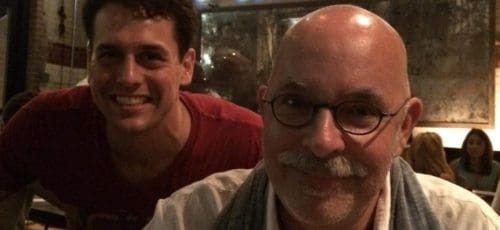Lee Etzold And Her World Of Funny
When it comes to creating art, Lee Etzold is not afraid to work up a sweat.
“I’m not really a sit-down-at-a-computer playwright. I’m more of a get-in-a-big-space-and-jump-around playwright,” she explains.
A lifelong athlete, Etzold has always been a very physical person. She played sports in high school and believed she would play basketball or field hockey in college. Everything changed when she auditioned for a school play and turned her attention to the arts. As an actor and playwright today, she brings her athletic background to the stage.
“Because I was an athlete first, I always have a physical approach to theater. I have better muscle memory than any other kind of memory,” she says; in fact, she never learns her lines until she learns her blocking. [Ed note: hmmm, actors have an excuse for everything.]
After college, Etzold moved to Philadelphia to work with New Paradise Laboratories, the experimental theater company headed by director Whit MacLaughlin. It was Philadelphia that inadvertently sparked her imagination and led her to create her own work.
Etzold originally moved to Philadelphia during the Philly Fringe and saw the city rife with musicians and actors. After the shows, she felt lonely as the city went back to business as usual. “I felt like everyone I had just met had vanished into their other lives. I started writing songs—ridiculously depressing songs that made me laugh at myself.”
Etzold started playing the songs for a cabaret put on through Brat Productions. The following year, she debuted them for the Philly Fringe late-night cabaret.
“[The songs] got me thinking, ‘oh, I can make stuff on my own!’” she says.
From the songs, she moved on to writing her own shows, and continues to do so. Etzold draws inspiration for creating shows from a few aspects of her past. She once thought she would become a teacher, and she now finds herself using her plays to poke fun at her desire to educate.
“It’s very pompous, actually,” she explains, “ I feel this need to impart knowledge, so I make fun of that by creating these instructional plays, and that seems to be something I keep gravitating towards.”
(For the record, Etzold, who arrived at our interview wearing an old Van Halen T-shirt, brightly-colored rain boots, and an expressive smile that never seems to leave her face, appears anything but pompous.)
These “instructional plays” have been inspired by sundry sources, including etiquette books and the How to——for Dummies book series.
Her physical approach to theater led to physical comedy and clowning. As she created more of her own work, Etzold found herself branching out and trying new things. In 2002, she was invited to join Pig Iron Theatre Company; she traveled to France with a few colleagues and put together a clown show called Flop.
“That was where I was really able to cut loose with my physical comedy in a more improvised way,” she says. Whereas at New Paradise the shows had been more structured and scripted, her work on Flop was “all about getting loose and free.”
Her entrance into the world of clowning was a natural outcome after she began to open herself up by writing her own plays and allowing her artistic and athletic senses to intermingle. Etzold admits that comedy comes naturally to her, and she says the simplicity of comedy is appealing, “You instantly know whether it’s working or not; if the audience is not laughing, then it’s not working.”
Having traveled around the world to perform, Etzold has had the unique experience of experimenting with her comedy in various cultures. She recalls a clown show she did in Edinburgh that fell flat. The show made fun of a song by Jewel, but it was only after the performance that Etzold learned most of the audience had never even heard of Jewel!
Overall, her experiences with international clowning have been mixed. In the UK, she says, audiences have been almost “super-saturated with red-nosed clowns.” Because they had had so much exposure to clowns already, these audiences proved more critical of performances; she has found that writing shows for audiences outside the US often requires a tailored focus.
“You have to either plan to make fun of their idea of what Americans are or you have to make it as universal as possible. There’s a new challenge in trying to create international clown work— you have to get to the core of human experience,” she says.
Her current work continues to explore physicality and pushes the limits of innovative and intelligent comedy. She will perform in this fall’s Live Arts Festival in Bang by Charlotte Ford.
Etzold worked with Ford on A Midsummer Night’s Dream a few years ago. Etzold enjoyed Ford’s daring sense of humor and found that it brought out a more daring aspect to her own performances. When Ford began crafting Bang, she asked Etzold to be a part of the production.
“Charlotte really wanted to explore female desire— not just ladies being sexy, but raising the question ‘being sexy for whom?’” explains Etzold. “How can clowns be sexy? Because the clown is such a mask, the characters are very full and your costume has a lot to do with your clown character. What happens when you start literally stripping away the costume—how do you maintain the clown character?”
The show also explores how sexuality can be funny, and specifically how women can make sexuality funny. Bang is still evolving, but at the moment, the crew is working on building characters to explore different aspects of female sexuality and desire.
Etzold’s next big move will be a piece about stunt women. She says this show is inspired by a PowerPoint presentation she once made about her inherent connections to Sigourney Weaver. With the show, she hopes to take the piece a step further and look at the connections (imagined and real) between actresses and their stunt doubles.
Always seeking ways to bring energy and laughs to her performances, Etzold says comedy has taught her, most of all, to trust her instincts.
–Prarthana Jayaram




